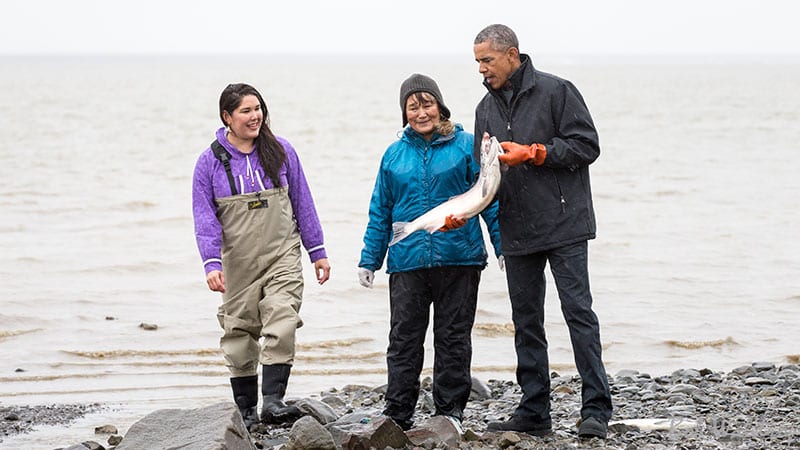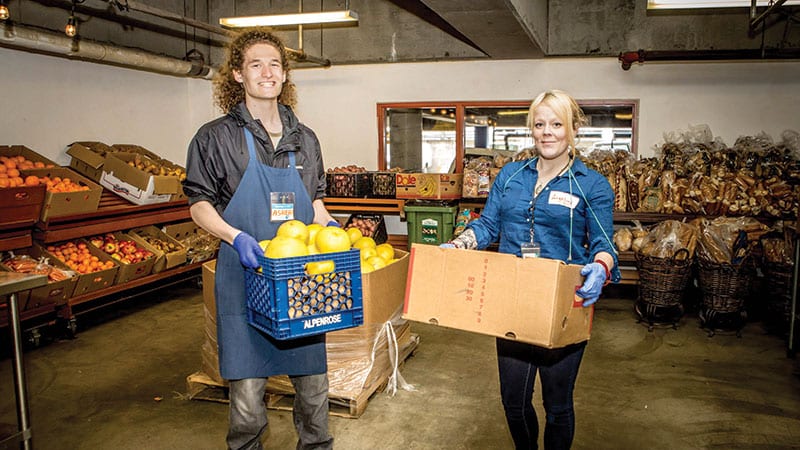Our co-op community
By Lamai Cox
This article was originally published in November 2019
PCC has strong Pacific Northwest roots. We have been giving to our community for decades—supporting neighborhoods, ensuring a sustainable and accessible food system and protecting the environment. Read on to learn about some of the latest projects we’ve assisted and connect with us online so we can support your efforts to build a more healthy and sustainable community.
Our co-op, our community regional: WINTER GRANT RECIPIENTS
Four times a year, PCC provides grants of up to $4,000 apiece to one organization fostering environmental stewardship and another involved in social action. This quarter, we are proud to award the grants to one institution finding better ways to feed hungry people and another one working to protect the world’s largest sockeye salmon fishery. Interested in applying for a future grant? Our application forms are online here.
Working for the health of vital salmon habitat

The Alaska Wild Salmon Fund is focused on conservation to ensure Alaska’s wild salmon thrive, now and for future generations. The fund benefits grassroots organizations in Alaska who work hands on to secure clean water and healthy habitat that salmon depend on, from the headwaters of Alaska’s pristine rivers to tidewater.
The current priority of the Alaska Wild Salmon Fund is to protect Bristol Bay, Alaska from the proposed Pebble Mine. Bristol Bay is home to the world’s largest and most valuable wild salmon fishery, which generates 50% of the world’s sockeye salmon.
Seattle has long had strong connections to Alaska’s wild salmon. The health of the fisheries has a direct correlation to the fishers, their families and our community in the greater Seattle region.
Our grant will support awareness and educational campaigns by tribal and conservation groups.
A new approach for Pike Place Market’s food bank

Hours before the Pike Market Food Bank opens, a long line has already formed for services. As people make their way through, the crowds and slow progress can discourage people from getting needed food, cause conflict and create a stressful “scarcity mentality” where clients worry they won’t be served adequately.
PCC’s grant will help the food bank switch to a “grocery model” setup like the shopping experience at a small market. It’s an increasingly common approach meant to give clients more individual choices, faster service, more flexible hours and a more relaxed environment. For staff, the benefits also include reduced food waste, an improved atmosphere, and the ability to help more people. Data from other Seattle-area food banks suggest the Pike Market Food Bank could see a 30% increase in food distribution and client visits.
The food bank serves anyone facing food insecurity who lives in downtown Seattle, whether homed or experiencing homelessness. About 1,000 people visit the food bank every week, with demand for its services rising more than 15% since last year. In addition to protein and canned goods, the food bank provides fresh produce, bread, and other food donated by Pike Place Market vendors. It’s one of the network of programs supported by the Pike Place Market Foundation, whose goal is to bring positive solutions to this community’s most pressing social challenges.
Our co-op, our community neighborhood:
Support neighborhood vitality — join a Turkey Trot!
Food banks strengthen our neighborhoods in many ways, even beyond providing food for those in need. For those seeking further assistance, food banks are often the first welcoming door to a network of human services. From healthcare to housing, clothing to education, they are a hub of support (oftentimes in more than one language) where people can find pathways to help themselves.
This Thanksgiving, PCC Issaquah and Ballard stores are sponsoring their partnering food banks’ Turkey Trots. All the funds raised by these annual “Trots” go directly to the food banks. They’re fun events, but also part of the diverse avenues of fundraising work that are essential to the operations of nonprofit food banks.
This season, we invite you to accompany us in supporting our neighborhoods by joining in a “Trot,” sharing this message, or donating to your neighborhood food bank.
Lamai Cox is PCC’s community relations program manager.
